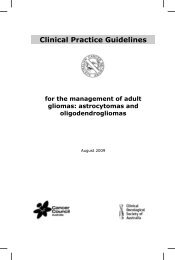Clinical Practice Guidelines for the management of locally advanced ...
Clinical Practice Guidelines for the management of locally advanced ...
Clinical Practice Guidelines for the management of locally advanced ...
Create successful ePaper yourself
Turn your PDF publications into a flip-book with our unique Google optimized e-Paper software.
<strong>for</strong> surgery, suggesting that surgery may have provided some benefit over sub-optimal-dose<br />
radio<strong>the</strong>rapy using old techniques. Patients treated with surgery had significantly higher incontinence<br />
rates and lower long-term urinary difficulty and gastrointestinal toxicity rates compared to those<br />
treated with radio<strong>the</strong>rapy.<br />
In a more recent update <strong>of</strong> this trial with a median follow-up <strong>of</strong> 102 months, surgery was associated<br />
with better survival and progression outcomes however none <strong>of</strong> <strong>the</strong>se benefits were statistically<br />
significant. 85<br />
Biochemical progression-free survival rates <strong>for</strong> <strong>the</strong> surgery and radio<strong>the</strong>rapy groups were 76.2%<br />
versus 71.1% respectively. Thus biochemical progression-free rates were better in <strong>the</strong> surgery group,<br />
as were <strong>the</strong> clinical progression-free rates <strong>of</strong> 83.5% versus 66.1%, and <strong>the</strong> cause-specific survival<br />
rates <strong>of</strong> 85.7% versus 77.1%. The overall survival rates were 67.9% versus 60.9%. There was a<br />
significantly higher incontinence rate in <strong>the</strong> surgery group, but no o<strong>the</strong>r significant difference in<br />
toxicity was reported.<br />
In 2003 Clark et al 99 reported a total <strong>of</strong> 123 patients who were randomised to an extended node<br />
dissection on <strong>the</strong> right side and a limited dissection on <strong>the</strong> left. However, only nine patients were T2b<br />
or T3 and no long-term survival was reported.<br />
Thomas et al 1992 100 in a small study randomised men with T3 or T4 prostate cancer and urinary<br />
retention to transurethral resection <strong>of</strong> <strong>the</strong> prostate and orchidectomy, or orchidectomy alone. On <strong>the</strong><br />
basis <strong>of</strong> <strong>the</strong> outcomes <strong>of</strong> <strong>the</strong> study, <strong>the</strong> authors recommended, because <strong>of</strong> <strong>the</strong> morbidity associated<br />
with <strong>the</strong> transurethral resection group, that surgery should take place only if <strong>the</strong> men failed to void<br />
after <strong>the</strong> initial orchidectomy.<br />
Evidence summary Level References<br />
For <strong>the</strong> treatment <strong>of</strong> <strong>locally</strong> <strong>advanced</strong> disease <strong>the</strong>re are no RCTs<br />
comparing surgery with modern higher-dose radio<strong>the</strong>rapy or ADT.<br />
For <strong>locally</strong> <strong>advanced</strong> disease <strong>the</strong>re are no RCTs examining <strong>the</strong><br />
efficacy <strong>of</strong> extended lymph node dissection compared with<br />
standard lymph node dissection.<br />
In one small RCT <strong>for</strong> men with urinary retention <strong>the</strong> addition <strong>of</strong> TURP<br />
to orchidectomy resulted in increased morbidity<br />
33<br />
Locally <strong>advanced</strong> disease<br />
II 100



